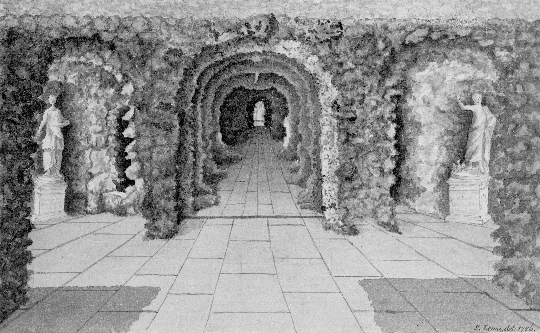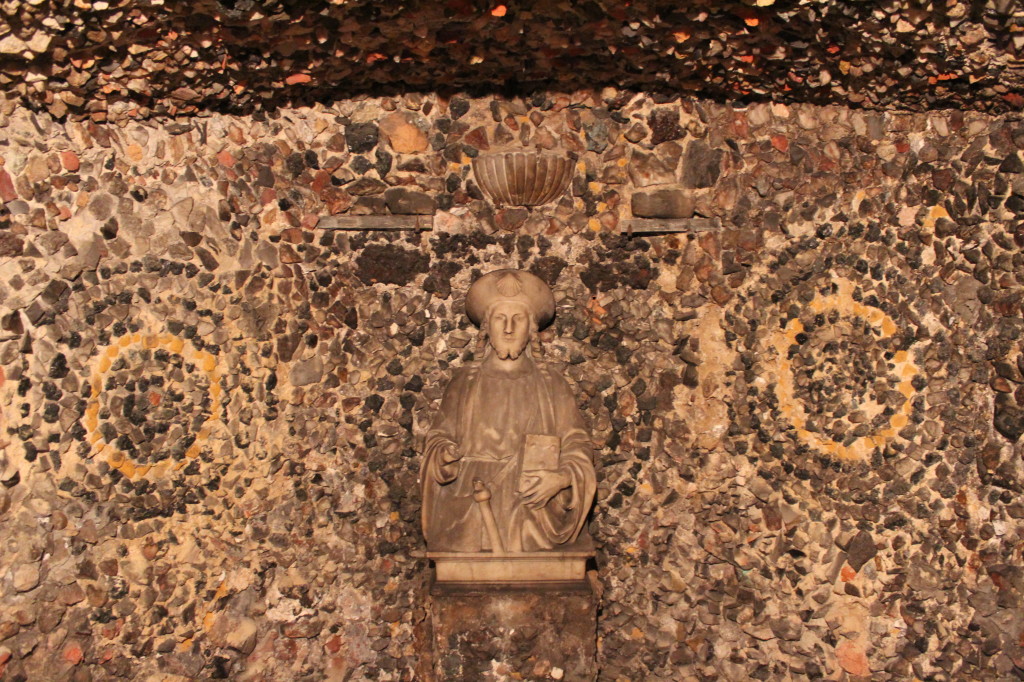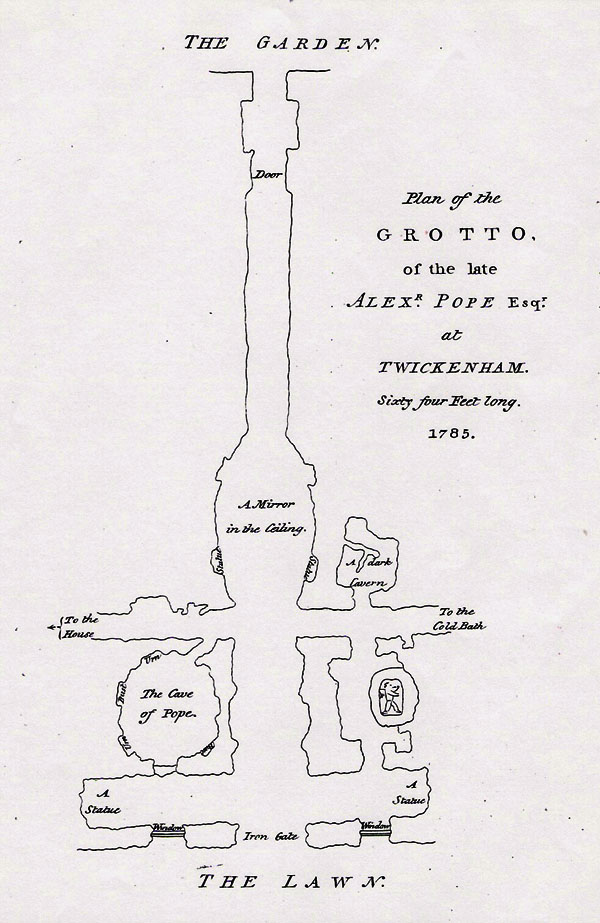【Tamil Archives】
Underground
Our Daily Correspondent

A sketch of Pope’s grotto.
Today marks the day of Alexander Pope’s birth, in 1688. We remember Pope as a poet, essayist, satirist, translator, and one of the most quotable men in English. He’s responsible for, among many other aphoristic gems: “To err is human, to forgive, divine.” “Fools rush in where angels fear to tread.” “What Reason weaves, by Passion is undone.” “Hope springs eternal in the human breast.” “A little learning is a dangerous thing.” And, yes, the phrase “Eternal sunshine of the spotless mind.”
In his time, he was also known for his amazing home, a Palladian villa at Twickenham surrounded by elaborate gardens and grottoes. Pope’s wealthy family was ostracized for its Catholicism, and his numerous health problems—he suffered from Pott’s disease, which stunted his growth to only four foot six—somewhat limited his social life. His home seems to have been a refuge, as well as a definitive indicator of his success.
The house, a Classical mansion surrounded by vast grounds, was grand enough, but it was the Homeric grotto that really got Pope’s heart racing. As he wrote at the time of its construction,
I have put the last hand to my works … happily finishing the subterraneous Way and Grotto: I then found a spring of the clearest water, which falls in a perpetual Rill, that echoes thru’ the Cavern day and night …When you shut the Doors of this Grotto, it becomes on the instant, from a luminous Room, a Camera Obscura, on the walls of which all the objects of the River, Hills, Woods, and Boats, are forming a moving Picture … And when you have a mind to light it up, it affords you a very different Scene: it is finished with Shells interspersed with Pieces of Looking-glass in angular Forms…at which when a Lamp…is hung in the Middle, a thousand pointed Rays glitter and are reflected over the place.
Later, he added, “Were it to have nymphs as well—it would be complete in everything.”

Photo via thelondonphile
After he visited a mine, Pope was inspired to decorate the grotto further with what the Twickenham museum describes as “ores, spars, mundic, stalactites, crystals, Bristol and Cornish diamonds, marbles, alabaster, snakestones and spongestone.” There were also rumors that he stole and cajoled some of these from neighboring sites, possibly defamatory in nature.
Apparently, the grotto was widely considered ridiculous. Lady Mary Wortley Montague mocked it:
Here chose the goddess her belov’d retreat,
Which Phoebus tries in vain to penetrate,
Adorn’d within with shells of small expense,
(Emblems of tinsel Rhyme and triffleing sense)
Perpetual fogs enclose the sacred Cave;
The neighbouring sinks their fragrant odours gave.

A sketch of the grotto by Samuel Lewis, 1785
Said Dr. Johnson, “A grotto is not often the wish or pleasure of an Englishman, who has more frequent need to solicit rather than exclude the sun, but Pope’s excavation was requisite as an entrance to his garden, and, as some men try to be proud of their defects, he extracted an ornament from an inconvenience, and vanity produced a grotto where necessity enforced a passage.”
But then, that’s the risk you run when you spend all your time with noted wits, I suppose. And in fact, grottoes were all the crack—indeed, Pope’s was so terrific that it apparently inspired several others.
The villa was demolished in the early nineteenth century, and nowadays the site is occupied by the modern buildings of the Radnor House School. Somewhat amazingly, the grottoes are still largely intact, if denuded of their mineral decorations, and are opened to the public a couple of times a year. Personally, I can’t imagine anything better—or, I guess, worse—to have under a high schoolthan a vast, forbidden series of caves, underground passages, and totally hidden retreats. Anyway, if I were part of the Pope’s Grotto Preservation Trust, I might have my concerns.
Pope, however, might have approved. As he wrote near the end of his life, “Most men in years, as they are generally discouragers of youth, are like old trees, which, being past bearing themselves, will suffer no young plants to flourish beneath them.”
Search
Categories
Latest Posts
The Trash of the System
2025-06-26 01:095 years later, celebrities put their hoodies up for Trayvon Martin
2025-06-26 00:59Finally, a phone that's perfect to bring to an EDM festival
2025-06-26 00:36Eat the Press
2025-06-25 23:18Popular Posts
On Enmity
2025-06-26 01:15Your BFF Emma Stone wore a Planned Parenthood pin to the Oscars
2025-06-26 00:22Lily Allen quits Twitter after trolls attack her over son's death
2025-06-26 00:22The Forgotten Man
2025-06-25 23:44Featured Posts
Hockey Sausage
2025-06-26 01:11People want to #DeleteUber after its last tweet in the Philippines
2025-06-26 00:56Lily Allen quits Twitter after trolls attack her over son's death
2025-06-26 00:55Oscars 2017: Full winners list
2025-06-26 00:19Cops on Campus
2025-06-25 22:47Popular Articles
The Long View in Granada
2025-06-26 00:14'Fake news' jokes dominate after Oscars best picture flub
2025-06-25 22:57New Iconoclasms
2025-06-25 22:49Newsletter
Subscribe to our newsletter for the latest updates.
Comments (1121)
Impression Information Network
GeForce RTX 2080 Ti & 2080 Mega Benchmark
2025-06-26 00:44Sky Information Network
Your first cry at the Oscars is meeting one of the real
2025-06-26 00:43Prospect Information Network
Half of the world's species could become extinct, biologists say
2025-06-26 00:32Fresh Information Network
'Homeland' sees 'The Return' of some old friends
2025-06-26 00:29Co-creation Information Network
New Iconoclasms
2025-06-25 22:48